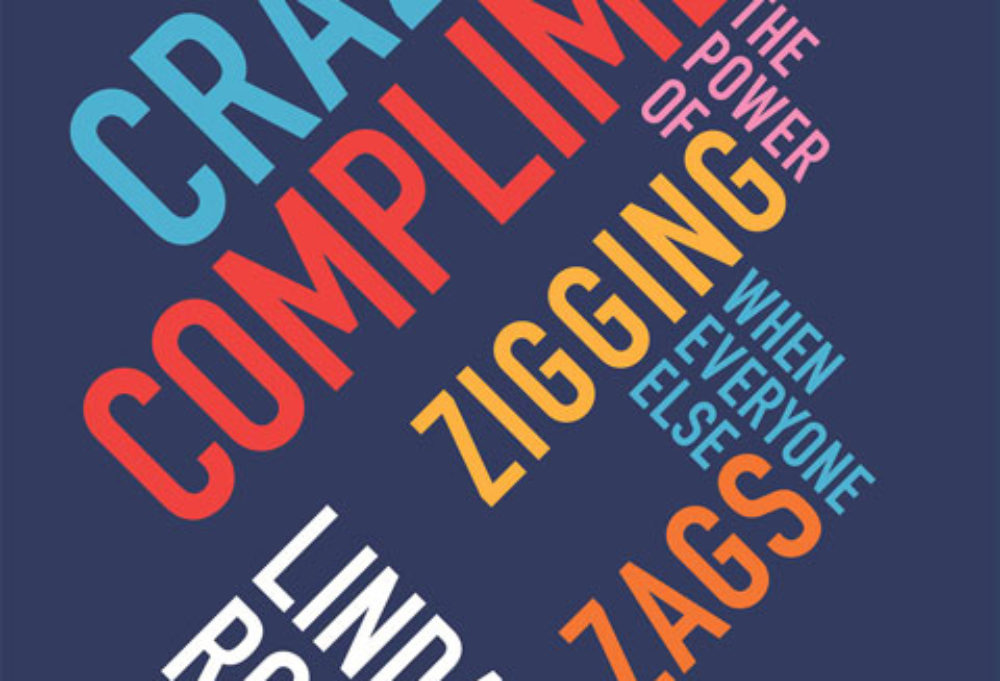
About halfway through her new book, Crazy is a Compliment: The Power of Zigging When Everyone Else Zags, Linda Rottenberg – a friend and one of the entrepreneurs I admire most – writes about the power of looking backwards.
One consistent theme of entrepreneurs who deftly navigate chaos is they don’t just look forward; they also look back. They don’t just seize opportunities, own their mistakes, and move on. In the midst of whatever mess they’re in, they also return to their core values. They reconnect with their origin stories. (p. 80)
Rottenberg cites Howard Schultz explaining his focus when he resumed the CEO role in 2008: “There is a piece of the past that we need; we have to find and bring the soul of our company back.”
Crazy is a look backwards, tracing the course of Rottenberg’s own development and the history of Endeavor, the organization that she co-founded and leads. Endeavor selects, mentors and supports exceptional entrepreneurs in countries where the entrepreneurial ecosystems need to be built up in order to generate economic growth. It is a look backwards, as well, at the group of nearly 1,000 Endeavor entrepreneurs, representing a constellation of businesses that today generate $6.5B in annual revenues.
What makes Crazy important is not so much that it provides another set of insights for those seeking entrepreneurial success as that it paints a picture of entrepreneurial success as one expression of a broader ethos. Rottenberg writes:
Nearly two decades ago I ventured out into the world to find dreamers who needed a little help making their dreams come true. Along the way I met a woman named Leila. She had been trained to sell hamburgers at a McDonald’s in Brazil but wanted to help her neighbors in the slums of Rio, where she grew up, feel better about their hair.
The first time I met her, she was soft-spoken, timid and intimidated by the world around her. She looked as if she might break. But with every barrier she crossed, every person she hired, and every milestone she achieved, she grew stronger. Today she runs an international company nearing $100 million in annual revenues, provides jobs for over twenty-three hundred people, and is a role model for entrepreneurs.” (p. 221 – 222)
Crazy unpacks the ways of operating that make the entrepreneurial ethos work, whether from Leila’s context of building a salon chain company from the ground up, building from within an organization or from any other context. Rottenberg makes the case that the largest challenges are inner challenges: both the emotional challenges of overcoming fear, shame and doubt – and the intellectual challenges of overcoming the ingrained concepts that can pull one away from the long journey of building almost anything great (e.g., “betting the farm” rather than “derisking risk”; overemphasis on having a big, breakthrough idea).
Rottenberg exemplifies the lessons she shares. Rottenberg’s idea and Endeavor’s idea is entrepreneurship itself – and entrepreneurs flourish in ecosystems. Crazy teaches us that ecosystems can be built and that the work of building can largely be done by others if the right work gets done to inspire them, link them and can create a structure in which that work can happen. Crazy charts Rottenberg’s progress from a messy beginning to what I consider to be one of the world’s most elegant organizations.
What makes Endeavor so elegant is that it is a “multiplier of multipliers”:
- Endeavor selects the highest-potential entrepreneurs, people who can best take advantage of resources and help
- Endeavor operates in the places where advancing entrepreneurship will make the most incremental difference
- Endeavor works as a magnet to attract and channel the deepest and best resources: the most significant business leaders in the countries in which they operate, the most effective mentors, etc.
- Endeavor creates networks that ensure that each new “node” (a new entrepreneur, a new expert, a new corporate partner) adds to the value of the other nodes
- Endeavor excels at being “sticky” in the sense that those who benefit – whether entrepreneurs or those who engage with them (participate in selection panels, fund entrepreneurs, advise, etc.) – stay engaged and give back to the system
We have only begun to see the exponential properties this system can deliver.
This pursuit of elegance is essential to Rottenberg’s last chapter, “Go Big AND Go Home,” in which she reflects on how entrepreneurship as an ethos encompasses unlocking whatever innovations are needed to enable the entrepreneur to build not just a great business but a life that embodies meaning, love and caring for those who matter most. As a soon-to-be father, I feel that, as Rottenberg demonstrates, the question of how to be successful as a parent as well as an entrepreneur is an invitation to think about how to work and create more elegantly.
Reading Crazy makes me understand better what it means to build a “multiplier of multipliers” and why that matters, both in one’s work and for one’s life. I look at Rottenberg’s journey building Endeavor and see a dozen periods the length of the eighteen months we’ve had so far to begin building Incandescent. Crazy brings to life the imperative to make each of those periods build exponentially on those that come before, to ensure we are building not just a company but an ethos and to focus on ideas that can be amplified by far greater work by many others. Crazy teaches us to look back while looking forward, and to love and trust the world enough not to shy away from dreaming it better.



